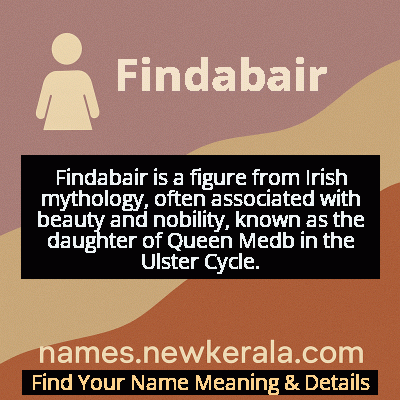Findabair Name Meaning & Details
Origin, Popularity, Numerology Analysis & Name Meaning of Findabair
Discover the origin, meaning, and cultural significance of the name FINDABAIR. Delve into its historical roots and explore the lasting impact it has had on communities and traditions.
Name
Findabair
Gender
Female
Origin
Celtic
Lucky Number
1
Meaning of the Name - Findabair
Findabair is a figure from Irish mythology, often associated with beauty and nobility, known as the daughter of Queen Medb in the Ulster Cycle.
Findabair - Complete Numerology Analysis
Your Numerology Number
Based on Pythagorean Numerology System
Ruling Planet
Sun
Positive Nature
Leaders, ambitious, highly driven, self-reliant, innovative.
Negative Traits
Overly aggressive, domineering, impatient, selfish.
Lucky Colours
Red, orange, gold.
Lucky Days
Sunday.
Lucky Stones
Ruby, garnet.
Harmony Numbers
2, 3, 9.
Best Suited Professions
Entrepreneurs, managers, engineers.
What People Like About You
Courage, determination, leadership.
Famous People Named Findabair
Findabair (Mythological)
Princess of Connacht
Central figure in the Táin Bó Cúailnge, offered as bride prize to multiple warriors
Findabair ingen Medb
Royal Princess
Daughter of Queen Medb and King Ailill, used as political pawn in epic conflicts
Finnabair (Literary Character)
Literary Figure
Featured in contemporary retellings of Irish mythology and fantasy literature
Name Variations & International Equivalents
Click on blue names to explore their detailed meanings. Gray names with will be available soon.
Cultural & Historical Significance
The name Findabair itself, derived from Old Irish elements meaning 'white' or 'fair' and 'phantom' or 'apparition,' adds layers of symbolic meaning to her character. Her beauty and fairness are constantly emphasized, yet these qualities become tools in her mother's political machinations. The tragic elements of her story—including her eventual death from shame after her multiple promised marriages fall through—create a poignant commentary on the costs of political ambition. Findabair's legacy extends beyond mythology into modern interpretations of Celtic culture, where she represents both the idealized beauty of ancient Ireland and the complex realities of women's lives in heroic societies. Her character continues to inspire discussions about agency, sacrifice, and the representation of women in mythological traditions.
Extended Personality Analysis
Those bearing the name Findabair often inherit a complex personality profile reflecting their mythological namesake's dual nature. Typically, they exhibit a blend of ethereal grace and underlying strength, much like the 'fair phantom' meaning suggests. These individuals usually possess exceptional diplomatic skills and emotional intelligence, having learned from early experiences to navigate complicated social landscapes. There's a noticeable quiet resilience that characterizes their approach to challenges—they may appear delicate but possess considerable inner fortitude. Their loyalty to family is profound, though they often struggle to balance this devotion with their own personal aspirations and moral convictions.
In social settings, Findabairs tend to be refined communicators with a persuasive, gentle manner that makes them effective mediators and peacemakers. They often excel in creative fields where they can express the romantic melancholy and ancient wisdom associated with their name. However, they must be cautious not to let their accommodating nature be mistaken for weakness or to become overly burdened by the expectations of others. The name carries an air of tragic beauty that can manifest as a tendency toward introspection and deep emotional connections. Those named Findabair often develop a unique perspective on life, combining practical wisdom with a touch of otherworldly insight that makes them both grounded and visionary in their approach to personal and professional relationships.
Modern Usage & Popularity
In contemporary naming practices, Findabair remains a distinctive choice primarily embraced by families with strong Irish cultural connections or those particularly drawn to Celtic mythology. The name has experienced a modest revival alongside growing interest in unique, meaningful names and the broader Celtic cultural resurgence. While it doesn't appear on mainstream popularity charts, Findabair maintains a consistent presence within Irish communities and among the diaspora in countries like the United States, Canada, and Australia. Many modern parents who choose this name appreciate its deep mythological roots and lyrical quality, though they often opt for the simplified spelling 'Finnabair' to make pronunciation more intuitive for those unfamiliar with Irish orthography. The name's complexity and strong cultural associations make it particularly popular among artistic, literary, and academic families who value its historical significance and distinctive character. Its rarity ensures that any modern Findabair will likely be the only one in her social circle, carrying forward an ancient tradition while maintaining individual uniqueness.
Symbolic & Spiritual Meanings
Findabair embodies rich symbolic meanings that extend far beyond her literal translation as 'white phantom' or 'fair apparition.' She represents the complex intersection of feminine beauty, political value, and personal sacrifice in Celtic tradition. The name symbolizes how physical attractiveness and royal status could simultaneously empower and constrain women in ancient societies—their beauty making them valuable as diplomatic assets while often limiting their personal autonomy. Findabair serves as a poignant symbol of the 'prize woman' archetype, whose worth was measured by her ability to secure political alliances through marriage. This reflects broader themes of women as currency in patriarchal power structures, where their desires were frequently secondary to political expediency.
The name also carries profound metaphorical significance regarding the tension between filial duty and individual identity. Findabair's mythological narrative illustrates the eternal struggle between loyalty to family and the pursuit of personal happiness—a conflict that remains relevant across cultures and centuries. Her tragic story arc, culminating in her death from shame, serves as a powerful metaphor for the psychological costs of being treated as a political commodity. In a broader sense, Findabair represents the often-silenced female perspectives in heroic narratives, symbolizing the resilience and dignity that women must maintain when their lives are shaped by others' ambitions. Her legacy continues to resonate as a symbol of both the privileges and constraints of beauty, the complexities of daughterhood, and the enduring human capacity for grace under political and emotional pressure.

